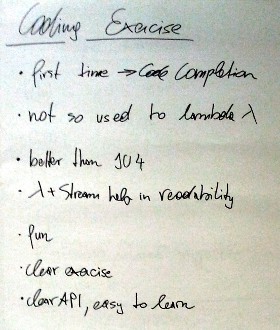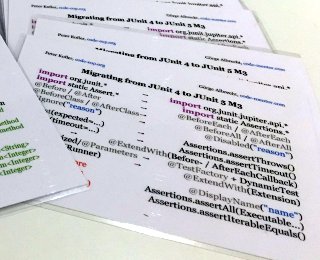 JUnit 4 and PHPUnit
JUnit 4 and PHPUnitInitially I created a few JUnit Testing Koans in 2012 as part of a JUnit training while I was with IBM. I wanted the training to be hands-on and interactive. (These koans are in the Unit Testing Koans repository.) In 2015 I picked up the idea and ported the code to PHP to run a PHPUnit workshop for my local community. (These koans are in the same repository.)
JUnit 5
In 2017, with the new version of JUnit, Görge Albrecht, the Code Mentor, helped me add koans for new features of JUnit 5. We used the koans as hands-on exercises which were a part of our JUnit 5 introductory workshop, delivered at Topconf Linz 2017 and other conferences. The exercises worked well and gave an overview of the (old and) new API and showed how to use it. People liked the workshop and had fun, see the points made during the retrospective of one of the workshops on the right. (The code is in the same repository.)
Python's unittest
It seems that the koans keep coming back to me ;-) - and I keep coming back to them, always adding more exercises and languages. This year I ported them to Python, which took me around five hours. I ran them as a short, Pragmatic Introduction to Python Unit Testing at PyDays 2018. I liked PyDays for its enthusiastic crowd and consider the workshop successful because in the final feedback round several participants reported happily that they had "written their first test" and that "it's not that hard!". Even experienced participants reported some learnings, like "I never used
skip" or "I did not know how to check the message in asserting exceptions". (The latest and greatest koans are in the same repository.)Teaching xUnit
Koans, i.e. learning progress verification by assertions, work well in both static and dynamic languages. There is no difference in workshops using Java and PHP or Python. Testing Koans are a suitable exercise to help people with their first steps in unit testing. In short two hours, people who have never seen a test will learn the concepts and flow of unit testing. I usually start with a few slides, about 20 minutes of theory about structure of xUnit tests before I ask people to work with the exercises.
 Like with JUnit 5, Testing Koans also work well to introduce people to new testing framework APIs and their usage. People familiar with JUnit 4 will need no more than a migration guide, see Görge's handouts on the right, to get their first impression of the new features. Some more advanced aspects will require them to research the documentation, but that is part of the exercise.
Like with JUnit 5, Testing Koans also work well to introduce people to new testing framework APIs and their usage. People familiar with JUnit 4 will need no more than a migration guide, see Görge's handouts on the right, to get their first impression of the new features. Some more advanced aspects will require them to research the documentation, but that is part of the exercise.People appreciate the "focused, step by step nature" of koans. The "exercise is clear" and "invites to explore xUnit". And most importantly "it was fun". In all the feedback I have collected for my xUnit Testing Koans, fun is dominant. And fun helps learning. (All quotes were taken as is from actual feedback I got.)
Moar Testing Koans!
Most xUnit frameworks are consistent with xUnit, and are similar in their usage. It is easy to port the koans to other languages, at least for basic examples. The same is true for newer versions. I should upgrade some koans to accommodate newer features of the used frameworks, on the other hand the basic features are still the same. I would love to see more ports and also Koans for different testing styles, e.g. RSpec or Jasmine Testing Koans.
Current List of Koans















